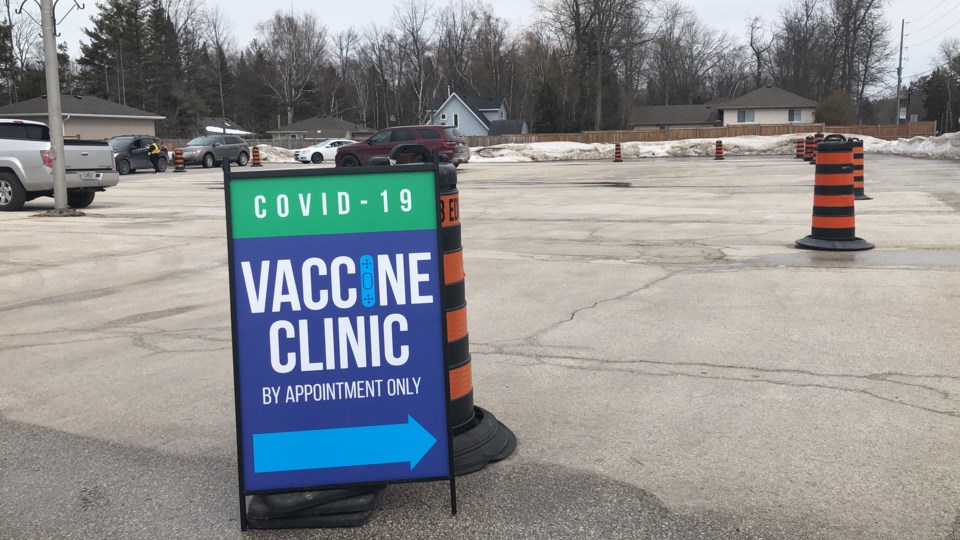With heightened scrutiny on the group of COVID vaccines being administered in Canada, the region’s medical officer of health is reassuring the public that immunization is “vastly” safer than getting COVID.
No vaccine is 100 per cent without side effects, and according to Public Health Ontario, that includes the COVID vaccines approved for use in Ontario.
This week, the province halted its rollout of AstraZeneca and Covishield first doses after noting an increase in a rare form of blood clot possibly linked to the vaccines.
Dr. Charles Gardner, medical officer of health for the Simcoe Muskoka District Health Unit, said the choice to be vaccinated is still a wise one.
“All vaccines can cause side effects, and by far the most common side effects are mild, self-limited, and of short duration,” said Gardner. “The overall risk from vaccination is vastly smaller than the risk of not accepting the vaccine, given the circulation of this dangerous virus in our community.”
Public Health Ontario and regional public health units have been keeping track of vaccine side effects for many years. Typically the public report is annual. Currently, the province’s public health agency puts out weekly reports on adverse events following immunization against COVID-19, using criteria from the World Health Organization to weigh the severity of side effects.
As of May 8, there had been 2,684 reports of adverse events following immunization against COVID in Ontario, which is a reporting rate of 43.7 per 100,000 doses administered. However, those “adverse events” can include anything from pain at the injection site and mild skin irritation to blood clots and possibly death.
Public Health Ontario reported 2,598 of those events (96.8 per cent) were “non-serious.”
There were 86 adverse events that met the “serious” criteria (reported with in-patient hospitalization or death). As of May 8, there were eight instances of vaccine-induced immune thrombotic thrombocytopenia (VITT) reported in Ontario. There are 10 deaths of individuals who received a COVID vaccine under investigation in Ontario, but Public Health Ontario states those deaths cannot be linked to the vaccine based on the investigation so far.
There have been 141 adverse effects following immunization against COVID-19 reported in the Simcoe-Muskoka Region (or approximately 50 reports per 100,000 doses or 26 reports per 100,000 population). Of those, four are considered “serious” under the World Health Organization and Public Health Ontario standard.
Those four were treated for anaphylaxis, and at least one person experiencing anaphylaxis after a vaccination was given epinephrine.
According to Dr. Gardner, there have been no instances of VITT, which are the blood clots linked to the AstraZeneca and Covishield vaccines.
“The majority of our adverse events were localized reactions, skin reactions, or mild allergic-type reactions,” said Gardner.
There was one documented case of erythema multiforme in the region, which is a potentially life-threatening type of skin rash. There have been no deaths linked to vaccines in Simcoe-Muskoka.
“Overall, these are well-tolerated vaccines, and we also know they’re highly effective vaccines,” said Gardner. “They’re addressing a critically important issue at this time, which is the control of the pandemic and protecting people from COVID-19, which is a severe respiratory viral infection.”
Public Health Ontario does regularly report on adverse events following any vaccination, and the system currently in place for reporting side effects from COVID vaccines has been in place for years.
According to provincial data from the 2018 annual vaccine safety report, there were 742 adverse event reports (5.1 per 100,000 population) from publicly-funded vaccines administered in Ontario. There were 21 serious adverse events (or 2.4 per 100,000 doses distributed).
The Canadian national adverse event following immunization rate for the same year was 7.2 adverse events per 100,000 population.
So far, there are about 18.4 adverse event reports per 100,000 population for COVID-19 vaccines in Ontario, a number Gardner noted is elevated compared to typical vaccine reporting in a non-pandemic year.
“I have reviewed that with colleagues … they feel at least to some degree, that would probably be heightened scrutiny and awareness, and attention being paid by everybody involved,” said Gardner. “Including patients reporting back to their physicians about anything that could be happening with them … I believe that is more likely to be the case, but I don’t know that for certain.”
The doctor acknowledged there are some people expressing hesitation over getting a vaccine, and some criticism over how quickly vaccines were developed to deal with COVID-19.
He said a combination of new technology and “tremendous motivation” to bring the pandemic under control led to, and even necessitated, quick delivery of vaccines.
“Even though they were developed quickly, all the necessary steps required in vaccine development were taken. They were done in an augmented, accelerated fashion, but they were all taken,” he said.
“It is vitally important that our vaccines and vaccination system be very safe. We have a duty to protect the public, both from COVID-19, but also from any potential harms associated with our response to it, including vaccines," he said.
Gardner said monitoring will continue not only locally, but provincially, nationally, and internationally. He said new variants could possibly require booster vaccines in the future.
He asked people to use reliable sources like Public Health Ontario and health unit websites to learn about immunization, and to be aware of misinformation against vaccination.
“I want to assure people that the wisest and safest choice is to accept the vaccine, given the overall situation we’re in,” said Gardner. “By participating in immunization, not only are [people] protecting themselves, but also their loved ones, their co-workers, and their contacts. And they’re being part of the overall solution to bring the pandemic under control and go back to more normal living.”
The health unit has more information about vaccines against COVID-19 on its website here.


